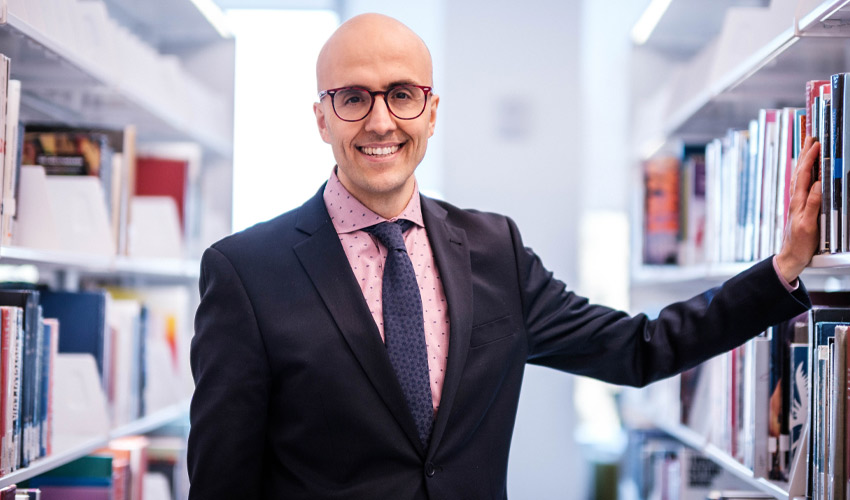Students and patients inform research of nursing professor Mohamed El-Hussein
— Mount Royal University | Posted: April 4, 2022

Researching health-care problems through a nursing lens is what drives Dr. Mohamed El-Hussein, PhD.
More than 131,000 Canadians each year suffer a fragility fracture after a slip, trip or fall from standing height — for example slipping on ice and breaking a wrist or hip. Having someone at home to care for them when they leave the hospital is critical to their recovery, but who are those people and how can we help them?
Researching health-care problems like these through a nursing lens is what drives Mount Royal University’s Dr. Mohamed El-Hussein, PhD, a professor in the School of Nursing and Midwifery as well as a nurse practitioner in clinical settings. El-Hussein is a co-investigator on a successful CIHR (Canadian Institutes of Health Research) grant for his work entitled, “What are the experiences and needs of informal caregivers of fracture patients in a rehabilitation setting?”
El-Hussein and his research team were also awarded supplemental funding for the project through the CIHR’s Mid-Career Investigator Prize in Research in Aging.
“Nursing is a practice-based profession, but a university is a place where you generate knowledge. In order to meet that objective, you need to have the tools to generate new knowledge. And one of the tools is to conduct research in a systematic and ethical manner.”
El-Hussein’s research journey began with receiving his Master of Science in Nursing in critical care and trauma nursing from Natal University, South Africa, and completing a doctorate and a nurse practitioner diploma at the University of Calgary. To date, he is credited with more than 50 publications and three books, with another on the way. El-Hussein also worked with paramedic and medical laboratory students, sharing his expertise in critical care and life sciences, and as a learning advancement specialist in the area of e-learning developing clinical placement co-ordination.
Past research has covered a range of topics including recognizing delirium in emergency departments, bridging the theory-practice gap in nursing, turnover among registered nurses, using visual narrative illustrations to teach pathophysiology concepts to nursing students, and decolonization in higher education.
“I wear two hats. I work with patients and I work with students and each has needs and expectations. There are certain questions I cannot answer in class because they have not been explored previously. The driver for my research is my students and my patients in order to better the outcomes for both.”
Searching for the best response to a common injury
In his current two-year study, El-Hussein and co-researchers will interview 60 caregivers of patients with fragility fractures and ask them about their experiences. They plan to interview caregivers shortly after the patient is discharged from a rehabilitation hospital and then one year later. Questions will centre around the role of the family in determining who becomes the primary caregiver, how they prepare for the patient being discharged, and their daily experiences in caring for the individual, including taking them to appointments. Caregivers will be identified through the hospital’s inpatient database, through social workers assigned to the patient, and through flyers posted at hospitals.
This research will inform the development of programs to address the needs of caregivers. That could include an education program where caregivers learn how to negotiate with their families about who takes on the role of looking after the patient. Such programs will help to improve the health and wellness of caregivers who save the Canadian health-care system an estimated $66.5 billion annually. These programs will also indirectly benefit patients who will be able to live at home for as long as possible.
It’s research like this that brings new and valuable perspectives to El Hussein’s classroom at MRU.
“You can be teaching for 20 years but before you know it you realize that the information you are relaying to the students is expired if you do not keep updating yourself based on research and evidence, especially in nursing. Because what was accepted five years ago is not accepted anymore in terms of medications, in terms of interventions,” El-Hussein says. “Things are really changing on a daily basis.”

